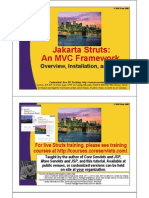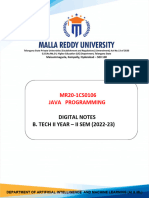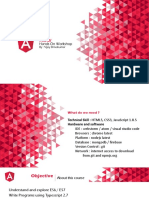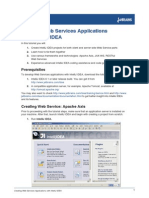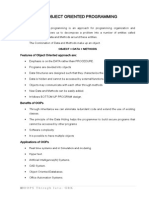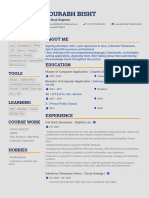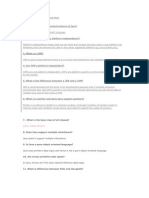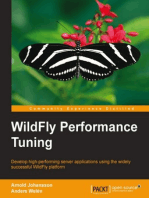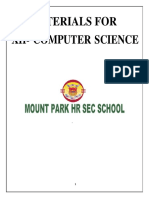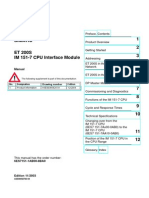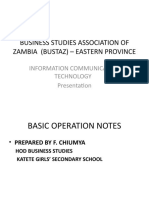Object Oriented Programming Methodology (CS and IT)
Uploaded by
Dreamtech PressObject Oriented Programming Methodology (CS and IT)
Uploaded by
Dreamtech PressObject Oriented Programming Methodology
` 399/-
The Object Oriented Programming Methodology (OOPM) book provides an easy-to-follow set of code and design standards to address the basic needs of Java programmers. The book is unique, as its content touches almost every important aspect of OOP methodology and Java language, such as what is OOP, how it is different from procedural programming, fundamental concepts of OOP (including class, object, abstraction, encapsulation, inheritance, and polymorphism), features of Java language, Java installation, and arrays, string, vectors, interfaces, threads, errors, exceptions, and applet programming in Java. The book provides lots of examples in an easy-to-understand language along with exercises at the end of each chapter.
Key Features of the Book:
u u
Procedural programming, top-down design and its drawbacks, OOP and its advantages, and Grady Booch methodology
Object, class, encapsulation or information hiding, abstraction, inheritance, polymorphism, message communication, reuse of code, coupling, cohesion, sufficiency, completeness, primitiveness, and metaclass
Evolution of Java, history of Java, how Java differs from other languages, features of Java language, installing and implementing Java, Java Virtual Machine (JVM), and bytecode
Development of a simple Java program, identifiers, keywords, literals, constants, separators, variables, data types, operators, expressions, and branching and looping statements
Class, object, method, modifier, constructor, destructor, iterator, method overloading, inheritance, method overriding, final class, and abstract class and abstract method
u u
Implementation of association, aggregation, and composition relationships Arrays, strings, and vectors
Interfaces, how to declare and implement interfaces in classes, variables in interfaces, how to extend an interface, and how an interface is different from an abstract class
Threads, how to instantiate and start a thread, how to start and run multiple threads, different states of a thread, and how to implement the thread synchronization mechanism and thread interaction
Grouping of classes for deployment and reuse, built-in packages, the java.lang package, wrapper classes, the java.util package, and creating and using user-defined packages
Exception handling, try and catch blocks, finally block, handling multiple exceptions, types of exceptions, built-in exceptions, and user-defined exceptions
Abstract Window Toolkit (AWT), AWT frames, applets, their life cycle, how to create applets, and how to use the Graphics and Color classes
ISBN: 978-93-5119-149-0 | Price: ` 399/ | Pages: 456 | Authors: Radha Shankarmani, Swati Ringe, KLSI
This Book Covers:
Shift from Procedural Programming to Object-Oriented Programming Object-Oriented (OO) Concepts t Object-Oriented Programming (OOP) t Java Language Elements and Flow Control Statements t Classes, Objects, and Methods in Java t
t
Classes and Relationships Arrays, Strings, and Vectors Interfaces t Multithread Programming t Packaging in Java t Managing Errors and Exceptions t AWT and Applet Programming t
t t
Table of Contents:
Programming Approach from Procedural to ObjectOrientation : Procedural Programming | Object-Oriented Programming | Grady Booch Methodology | Object Oriented (OO) Concepts: Object | Class | Encapsulation or Information Hiding | Abstraction | Inheritance | Polymorphism | Message Communication | Reuse | Coupling and Cohesion | Sufficiency, Completeness, and Primitiveness | Metaclass | Object-Oriented Programming (OOP): Java Evolution | Why Java Became So Popular? | History of Java | How Java Differs from Others | Overview of Java Language | Installing and Implementing Java | Java Virtual Machine | Java Language Elements and Flow Control Statements: Developing a Simple Java Program | Identifiers | Keywords | Literals | Constants | Separators | Variables | Data Types | Operators and Expressions | Branching and Looping | Classes, Objects, and Methods in Java: Class, Object, and Method | Constructor | Destructor | Iterator | Method Overloading | Inheritance | Method Overriding | Final Class | Abstract Class and Method | Classes and Relationships: Implementation of Association | Implementation of Aggregation | Implementation of Composition | Arrays, Strings, and Vectors: Arrays | Strings | Vectors | Interfaces: Exploring Interfaces | Variables in Interfaces | Extending an Interface | Difference between an Abstract class and an Interface | When Would You Use an Abstract Class and When to Use Interface? | Multithread Programming: Defining Threads | Instantiating a Thread | Starting Threads | Starting and Running Multiple Threads | Exploring the Thread States | Implementing the Thread Synchronization Mechanism | Implementing Thread Interaction | Packaging in Java: Grouping of Classes for Deployment and Reuse | Built-in Packages | The java.lang Package | Wrapper Classes | The java.util Package | Creating and Using User-Defined Packages | Managing Error and Exception: Errors and Exceptions in a Java Program | Exception Hierarchy | Exception Handling | Handling Multiple Exceptions | Types of Exceptions | AWT and Applet Programming: Introducing AWT | Using AWT Frames | Getting an Overview of Applets | Applet Security Restrictions | Exploring Life Cycle of an Applet | Comparing Applets and Applications | Creating Applets | Working with the Graphics Class | Working with the Color Class |
About the Authors:
Radha Shankarmani is currently working as Associate Professor at the Department of Information Technology, Sardar Patel Institute of Technology, Mumbai, India. She is also pursuing her Doctorate from JNTU, Hyderabad. Prof. Shankarmani holds a Masters degree in Computer Science and Engineering from NIT, Trichy and a Bachelors degree from PSG College of Technology in Electronics and Communication Engineering. Her areas of interest include Software Engineering, Software Testing, Software Architecture, Databases, Data Warehousing and Mining, Computer Simulation and Modeling, Management Information System and SOA. Having more than 16 years of teaching experience and 4 years of industry experience, she has held designations, such as Programmer, Software Engineer and Manager. She did her sabbatical for two months in Infosys, Pune in 2005 and has co-authored two books "Middleware and Enterprise Integration Technologies" and "Game Architecture and Programming" for Wiley India. She has published papers in several national and international conferences and journals. Swati Ringe is currently working as Assistant Professor at the Department of Computer Engineering, Fr.Conceicao Rodrigues College of Engineering, Mumbai, India. She has done her Masters degree in Computer Engineering from T.S.E.C. Bandra, Mumbai and Bachelors degree from Govt. College of Engineering, Aurangabad. She has also worked in software development as Intranet Head and project leader in software development companies. She has 13 years of teaching experience. Her areas of interest include Web Technologies, Internet and Computer Networks, Service Oriented Architecture, Middleware Technologies and Enterprise Application Integration, Theory of Computer Science, Object Oriented Programming, and Distributed Computing. She has published papers in several national and international conferences and journals. The proficient teams at Kogent Learning Solutions Inc. and Dreamtech Press have seized the market of engineering textbooks, bringing excellent content in engineering and technical education to the fore. These teams are committed to providing excellence in the quality of content by judiciously analyzing the needs of their readers and ensuring dedication of their authors and editors in catering to these needs.
Published by:
DREAMTECH PRESS
WILEY INDIA PVT. LTD.
4435-36/7, Ansari Road, Daryaganj 19-A, Ansari Road, Daryaganj New Delhi-110 002, INDIA New Delhi-110 002, INDIA Tel: +91-11-4363 0000, Fax: +91-11-2327 5895 Tel: +91-11-2324 3463-73, Fax: +91-11-2324 3078 Email: csupport@wiley.com Email: feedback@dreamtechpress.com Website: www.wileyindia.com Website: www.dreamtechpress.com Regional Offices: Bangalore: Tel: +91-80-2313 2383, Fax: +91-80-2312 4319, Email: blrsales@wiley.com Mumbai: Tel: +91-22-2788 9263, 2788 9272, Telefax: +91-22-2788 9263, Email: mumsales@wiley.com Contact Persons: Raju Joseph: +91-9845065992 | Sandeep Rao: +91-9620215542 | Arun Kumar: +91-9611231170
Exclusively Distributed by:
/dtechpress
/dtechpress
/dreamtechpress
/company/dreamtech-press
You might also like
- Java 17 Backend Development: Design backend systems using Spring Boot, Docker, Kafka, Eureka, Redis, and TomcatFrom EverandJava 17 Backend Development: Design backend systems using Spring Boot, Docker, Kafka, Eureka, Redis, and TomcatNo ratings yet
- Executive Data Science A Guide To Training and Managing The Best Data Scientists by Brian Caffo, Roger D. Peng, Jeffrey T. Leek100% (1)Executive Data Science A Guide To Training and Managing The Best Data Scientists by Brian Caffo, Roger D. Peng, Jeffrey T. Leek150 pages
- Mergers & Acquisitions and Corporate Valuation0% (1)Mergers & Acquisitions and Corporate Valuation2 pages
- Jakarta Struts: An MVC Framework: Overview Installation and Setup Overview, Installation, and SetupNo ratings yetJakarta Struts: An MVC Framework: Overview Installation and Setup Overview, Installation, and Setup17 pages
- JDevelopers Guide - IBM Java Interview Questions For 3-8 Year ExperienceNo ratings yetJDevelopers Guide - IBM Java Interview Questions For 3-8 Year Experience3 pages
- Distributed Systems: Dr.P.Amudha Associate Professor100% (4)Distributed Systems: Dr.P.Amudha Associate Professor38 pages
- DB Campus Drive Preparation Materials Geeks4GeeksNo ratings yetDB Campus Drive Preparation Materials Geeks4Geeks14 pages
- Project Report On Rich Internet Application For Automatic College Timetable Generation (24th March 2008)100% (1)Project Report On Rich Internet Application For Automatic College Timetable Generation (24th March 2008)112 pages
- Flutter - IDE Shortcuts For Faster DevelopmentNo ratings yetFlutter - IDE Shortcuts For Faster Development21 pages
- Java Web Services Interview Questions and Answers: Overview: Integration Styles?No ratings yetJava Web Services Interview Questions and Answers: Overview: Integration Styles?25 pages
- What Is Devops - Devops Overview: VisualpathNo ratings yetWhat Is Devops - Devops Overview: Visualpath7 pages
- AWS Certified Developer Associate Guide Your one stop solution to pass the AWS developer s certification 1st Edition Vipul Tankariya 2024 Scribd Download100% (2)AWS Certified Developer Associate Guide Your one stop solution to pass the AWS developer s certification 1st Edition Vipul Tankariya 2024 Scribd Download65 pages
- Oauth 2.0: Amit Harsola Wipro TechnologiesNo ratings yetOauth 2.0: Amit Harsola Wipro Technologies65 pages
- Cloud & Devops: Continuous TransformationNo ratings yetCloud & Devops: Continuous Transformation13 pages
- Laravel Interview Questions With AnswersNo ratings yetLaravel Interview Questions With Answers4 pages
- What Is The Most Important Feature of Java?: CCC C CCNo ratings yetWhat Is The Most Important Feature of Java?: CCC C CC13 pages
- Java Means Durga Soft: DURGA SOFTWARE SOLUTIONS, 202 HUDA Maitrivanam, Ameerpet, Hyd. PH: 040-64512786No ratings yetJava Means Durga Soft: DURGA SOFTWARE SOLUTIONS, 202 HUDA Maitrivanam, Ameerpet, Hyd. PH: 040-6451278619 pages
- Spring Boot Interview Questions and AnswersNo ratings yetSpring Boot Interview Questions and Answers6 pages
- Node - Js - Interview Questions - TutorialspointNo ratings yetNode - Js - Interview Questions - Tutorialspoint12 pages
- The Node - Js Developer Roadmap For 2021No ratings yetThe Node - Js Developer Roadmap For 20216 pages
- Introduction To RDBMS Participant GuideNo ratings yetIntroduction To RDBMS Participant Guide182 pages
- (Ebooks PDF) Download Understanding Oracle APEX 20 Application Development: Think Like An Application Express Developer Edward Sciore Full Chapters100% (6)(Ebooks PDF) Download Understanding Oracle APEX 20 Application Development: Think Like An Application Express Developer Edward Sciore Full Chapters62 pages
- Principles of Information Security 7th Edition Michael E. Whitman 2024 scribd download100% (4)Principles of Information Security 7th Edition Michael E. Whitman 2024 scribd download66 pages
- The Datadog Handbook: A Guide to Monitoring, Metrics, and TracingFrom EverandThe Datadog Handbook: A Guide to Monitoring, Metrics, and TracingNo ratings yet
- Getting Mean With Mongo, Express, Angular, and NodeNo ratings yetGetting Mean With Mongo, Express, Angular, and Node2 pages
- Software Project Management (Includes Practicals)No ratings yetSoftware Project Management (Includes Practicals)2 pages
- Practical Business Analytics Using SAS A Hands-On GuideNo ratings yetPractical Business Analytics Using SAS A Hands-On Guide1 page
- Learning Bentley STAAD Pro V8i For Structural Analysis42% (12)Learning Bentley STAAD Pro V8i For Structural Analysis2 pages
- Advanced Fortran Programming: National Computational InfrastructureNo ratings yetAdvanced Fortran Programming: National Computational Infrastructure45 pages
- Siject: The All-In-One System For Injection Molding MachinesNo ratings yetSiject: The All-In-One System For Injection Molding Machines2 pages
- IMS-ZXUN CSCF-A-EN-Maintenance & Troubleshooting-System Maintenance-Routine Operations Guide-1-TM-201010-73No ratings yetIMS-ZXUN CSCF-A-EN-Maintenance & Troubleshooting-System Maintenance-Routine Operations Guide-1-TM-201010-7373 pages
- PDF Measurement Systems and Sensors Artech House Ebook Full Chapter100% (7)PDF Measurement Systems and Sensors Artech House Ebook Full Chapter53 pages
- Business Studies Association of Zambia (Bustaz) - Eastern ProvinceNo ratings yetBusiness Studies Association of Zambia (Bustaz) - Eastern Province29 pages
- The Research of Highway Construction Project Information Comprehensive Management SystemNo ratings yetThe Research of Highway Construction Project Information Comprehensive Management System8 pages








